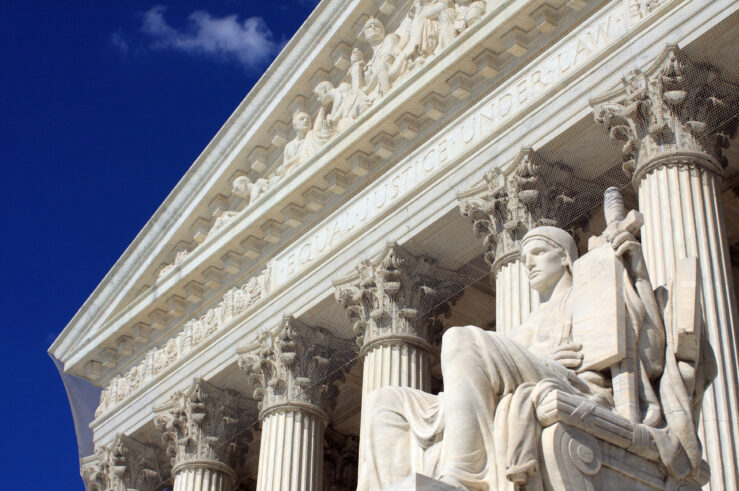A First Glance at the Biden Executive Order on Competition: The Good and the Bad (Including Much that Looks Ugly)
The Biden Administration’s July 9 Executive Order on Promoting Competition in the American Economy is very much a mixed bag—some positive aspects, but many negative ones. It will have some positive effects on economic welfare, to the extent it succeeds in lifting artificial barriers to competition that harm consumers and workers—such as allowing direct sales ... A First Glance at the Biden Executive Order on Competition: The Good and the Bad (Including Much that Looks Ugly)
FTC Competition Rulemaking Flunks a Cost-Benefit Test
There is little doubt that Federal Trade Commission (FTC) unfair methods of competition rulemaking proceedings are in the offing. Newly named FTC Chair Lina Khan and Commissioner Rohit Chopra both have extolled the benefits of competition rulemaking in a major law review article. What’s more, in May, Commissioner Rebecca Slaughter (during her stint as acting ... FTC Competition Rulemaking Flunks a Cost-Benefit Test
Dynamic Merger Efficiencies: The Case of Pharmaceutical Markets
The recent launch of the international Multilateral Pharmaceutical Merger Task Force (MPMTF) is just the latest example of burgeoning cooperative efforts by leading competition agencies to promote convergence in antitrust enforcement. (See my recent paper on the globalization of antitrust, which assesses multinational cooperation and convergence initiatives in greater detail.) In what is a first, ... Dynamic Merger Efficiencies: The Case of Pharmaceutical Markets
The Supreme Court Misses the Big Consumer Welfare Picture in NCAA v. Alston
In its June 21 opinion in NCAA v. Alston, a unanimous U.S. Supreme Court affirmed the 9th U.S. Circuit Court of Appeals and thereby upheld a district court injunction finding unlawful certain National Collegiate Athletic Association (NCAA) rules limiting the education-related benefits schools may make available to student athletes. The decision will come as no ... The Supreme Court Misses the Big Consumer Welfare Picture in NCAA v. Alston
NY ‘Abuse of Dominance’ Bill Attacks Consumer Welfare and the US Antitrust Tradition
U.S. antitrust law is designed to protect competition, not individual competitors. That simple observation lies at the heart of the Consumer Welfare Standard that for years has been the cornerstone of American antitrust policy. An alternative enforcement policy focused on protecting individual firms would discourage highly efficient and innovative conduct by a successful entity, because ... NY ‘Abuse of Dominance’ Bill Attacks Consumer Welfare and the US Antitrust Tradition
The Globalization of Antitrust: A Cost-Benefit Appraisal
Overview Virtually all countries in the world have adopted competition laws over the last three decades. In a recent Mercatus Foundation Research Paper, I argue that the spread of these laws has benefits and risks. The abstract of my Paper states: The United States stood virtually alone when it enacted its first antitrust statute in ... The Globalization of Antitrust: A Cost-Benefit Appraisal
The Future of FTC Equitable Monetary Relief after AMG Capital Management
The U.S. Supreme Court’s just-published unanimous decision in AMG Capital Management LLC v. FTC—holding that Section 13(b) of the Federal Trade Commission Act does not authorize the commission to obtain court-ordered equitable monetary relief (such as restitution or disgorgement)—is not surprising. Moreover, by dissipating the cloud of litigation uncertainty that has surrounded the FTC’s recent ... The Future of FTC Equitable Monetary Relief after AMG Capital Management
Four Reasons to Reject Neo-Brandeisian Critiques of the Consumer Welfare Approach to Antitrust
In the battle of ideas, it is quite useful to be able to brandish clear and concise debating points in support of a proposition, backed by solid analysis. Toward that end, in a recent primer about antitrust law published by the Mercatus Center, I advance four reasons to reject neo-Brandeisian critiques of the consensus (at ... Four Reasons to Reject Neo-Brandeisian Critiques of the Consumer Welfare Approach to Antitrust
Congress Should Not Legalize a News Media Cartel
Amazingly enough, at a time when legislative proposals for new antitrust restrictions are rapidly multiplying—see the Competition and Antitrust Law Enforcement Reform Act (CALERA), for example—Congress simultaneously is seriously considering granting antitrust immunity to a price-fixing cartel among members of the newsmedia. This would thereby authorize what the late Justice Antonin Scalia termed “the supreme ... Congress Should Not Legalize a News Media Cartel
Guiding a Post-Brexit UK Trade Liberalization Strategy
In the wake of its departure from the European Union, the United Kingdom will have the opportunity to enter into new free trade agreements (FTAs) with its international trading partners that lower existing tariff and non-tariff barriers. Achieving major welfare-enhancing reductions in trade restrictions will not be easy. Trade negotiations pose significant political sensitivities, such ... Guiding a Post-Brexit UK Trade Liberalization Strategy
The NCAA: Dr Jekyll or Mr Hyde?
The U.S. Supreme Court will hear a challenge next month to the 9th U.S. Circuit Court of Appeals’ 2020 decision in NCAA v. Alston. Alston affirmed a district court decision that enjoined the National Collegiate Athletic Association (NCAA) from enforcing rules that restrict the education-related benefits its member institutions may offer students who play Football ... The NCAA: Dr Jekyll or Mr Hyde?
Farewell
On Monday, April 2, I will leave the Heritage Foundation to enter federal government service. Accordingly, today I am signing off as a regular contributor to Truth on the Market. First and foremost, I owe a great debt of gratitude to Geoff Manne, who was kind enough to afford me access to TOTM. Geoff’s outstanding ... Farewell












